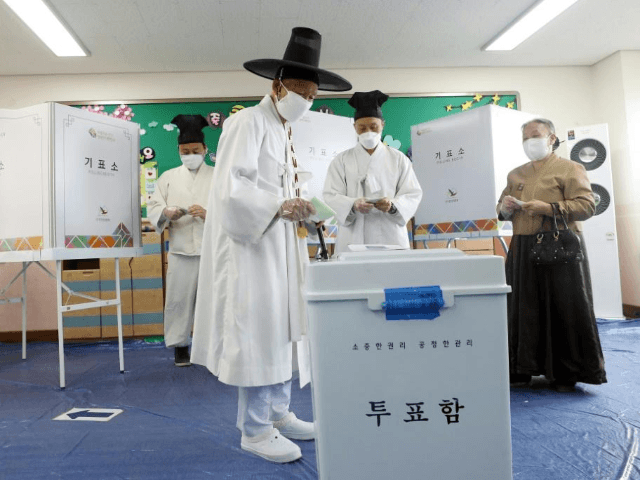South Korea’s ruling left-wing Democratic Party of Korea (DPK) is projected to win a majority of parliament seats in Wednesday’s general election, held amidst the country’s ongoing efforts to contain the spread of the Wuhan coronavirus.
At press time on Wednesday, 58.2 percent of votes had been counted, with the DPK taking the lead in 154 constituencies across South Korea, followed by the main opposition right-wing United Future Party (UFP) with 94 districts, according to the National Election Commission (NEC). The country held the quadrennial parliamentary election to fill the 300-member unicameral National Assembly, with 253 directly contested seats and 47 proportional representation seats.
The ruling DPK could secure about 170 parliamentary seats, South Korean news agency Yonhap estimated on Wednesday. The governing party is set to control a majority of parliament for the first time in 16 years, which would lend support to South Korean President Moon Jae-in’s reform initiatives, including the reform of prosecutors.
South Korea has now become the first major country in the world to hold nationwide elections since the Wuhan coronavirus pandemic emerged from Wuhan, China, late last year. The NEC took special measures to ensure voter health safety during the elections, as South Korea continues efforts to contain the Wuhan coronavirus. People in self-isolation for the coronavirus were allowed to vote at a special time after regular voting ended, which saw the government temporarily lift quarantine rules.
Voter turnout in the parliamentary elections was roughly 66.2 percent, South Korea’s highest voter turnout in 28 years, according to the NEC.
President Moon Jae-in is now in his third year in office after first being elected in May 2017. Wednesday’s election had been considered a midterm test for Moon Jae-in, whose government some say has contributed to a slowdown in new coronavirus cases in South Korea. In mid-March, however, the country reported an increase in new cases in Seoul and Daegu, casting doubt on the reported slowdown in new cases nationwide and causing some to fear a surge in new cases across the country.
Though South Korea’s conservative UFP was not expected to win Wednesday’s elections, it highlighted the ruling DPK’s failure to support the country’s economy and stressed the need to keep the DPK in check.
At press time on Wednesday, South Korea had officially recorded 10,591 infections and 225 deaths from the Wuhan coronavirus.

COMMENTS
Please let us know if you're having issues with commenting.